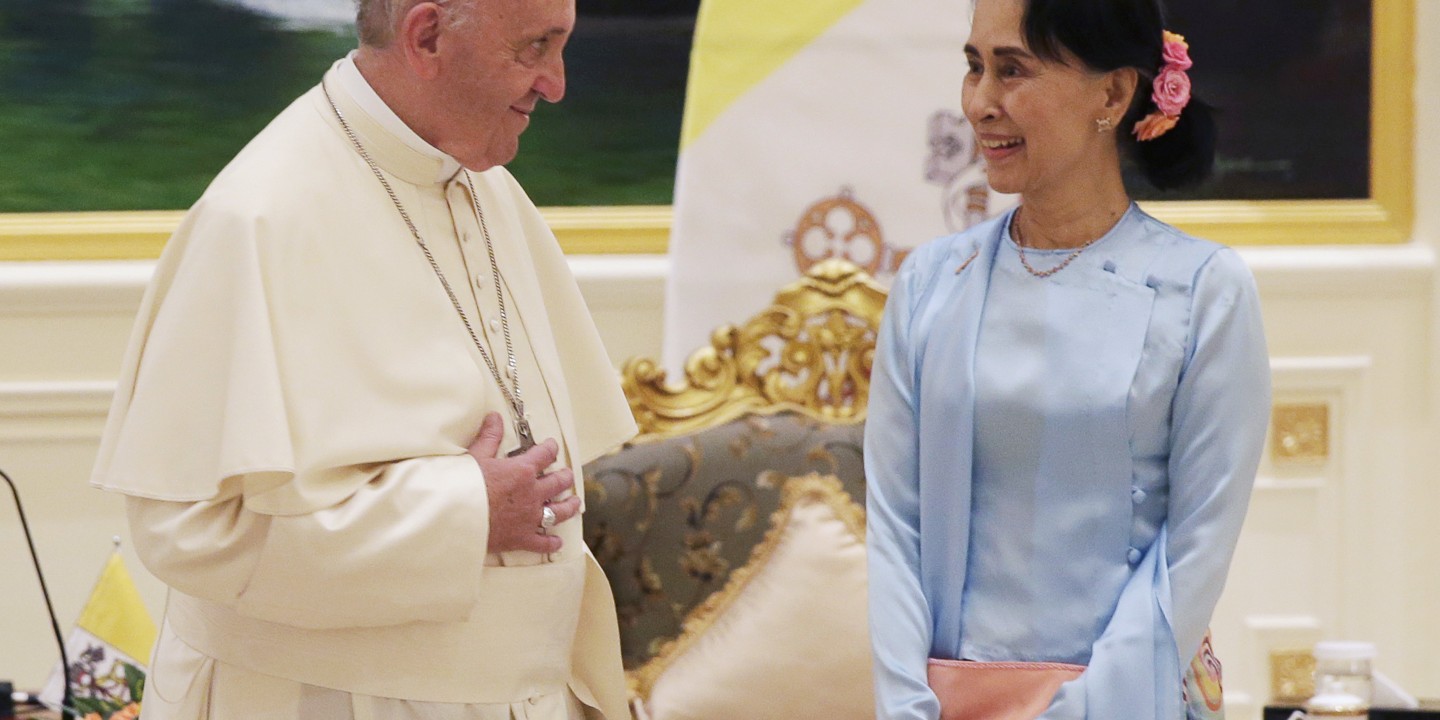Was the pope being "both prophetic and diplomatic" on the Rohingya crisis?
In Francis' recent trip to Myanmar and Bangladesh, he heard calls to condemn persecution of Muslims and fears of violence against Christians.

Pope Francis opened a diplomatically fraught trip to Myanmar and Bangladesh by immediately diving into the crisis over Myanmar’s crackdown on Rohingya Muslims: he met with the country’s military chief even before beginning the official program of his trip.
“They spoke of the great responsibility of the authorities of the country in this moment of transition,” said Vatican spokesman Greg Burke of Francis’s 15-minute visit with Gen. Min Aung Hlaing in the residence of the archbishop of Yangon, Cardinal Charles Bo.
Read our latest issue or browse back issues.
The general is in charge of security in Rakhine State, where the military’s “clearance operations” against the Muslim minority have sent more than 620,000 Rohingya fleeing into neighboring Bangladesh. Refugees there have told of entire villages being burned and women and girls being raped.
The pope’s meeting with the general was set up to occur before his visit to the country’s civilian leader, Nobel Peace Prize laureate Aung San Suu Kyi; the Vatican did not say why.
The general’s office said in a statement that he is willing to have “interfaith peace, unity, and justice” and that there was no religious or ethnic persecution or discrimination in Myanmar.
Rohingya Muslims have faced state-supported discrimination in the predominantly Buddhist country for decades. Although members of the ethnic minority first arrived generations ago, they were stripped of their citizenship in 1982, denying them almost all rights and rendering them stateless. They cannot travel freely, practice their religion, or work as teachers or doctors, and they have little access to medical care, food, or education.
Pope Francis’s trip was planned before the latest spasm of violence erupted in August, when a group of Rohingya militants attacked security positions in Rakhine and Myanmar security forces responded with a scorched-earth campaign.
“Being a religious leader—Catholic leader—means that he is well-regarded, but of course there is this worry if he says something, people might say, ‘OK, he just came to meddle,’” said Burmese analyst Khin Zaw Win, a former political prisoner. “A lot of diplomacy is needed, in addition to the public relations.”
In Myanmar the government and most of the Buddhist majority recoil from calling the people “Rohingya,” saying instead that they are “Bengalis” who migrated illegally from Bangladesh.
Thomas J. Reese, a Jesuit priest who is part of the U.S. Commission on International Religious Freedom, wrote in a commentary that “Myanmar’s cardinal, Archbishop Charles Bo, asked the pope not to use the word Rohingya because he feared the small Catholic minority would be attacked.” Francis met that request while speaking to Myanmar’s leadership about ending the conflict and building “peace based on respect for the dignity and rights of each member of society, respect for each ethnic group and its identity.”
Reese saw this approach as “being both prophetic and diplomatic,” though he sympathized with human rights activists who wanted the pope to more clearly condemn the treatment of the Rohingya. He noted that the risks of such a statement would not be borne by the pope alone. The commission Reese is part of has documented persecution of Christians as well as Muslims in Myanmar.
“I have no doubt that Pope Francis would have been willing to put his own life at risk, but to put other lives at risk would be reckless, especially when it is unlikely that his words would have had any effect on the military, which continues to deny that any discrimination or ethnic cleansing is going on,” wrote Reese.
In meeting with Rohingya Muslim refugees in Dhaka, the capital of Bangladesh, on December 1, Francis apologized for the “indifference of the world” to their plight and demanded that their rights be recognized.
“The presence of God today is also called Rohingya,” he said. “In the name of all those who persecute you, who have persecuted you, and those who have hurt you, above all in the indifference of the world, I ask you for forgiveness.”
Twelve men, two women, and two young girls had traveled to Dhaka from Cox’s Bazar, the district bordering Myanmar where refugee camps are overflowing with people who have fled the violence. Prior to the pope’s comments, the Rohingya who came to the capital urged him to recognize their identity publicly.
“He is the leader of the world,” said Mohammed Ayub, 32, whose three-year-old son was killed by the Myanmar military. “He should say the word as we are Rohingya.”
In the Kutupalong refugee camp in southern Bangladesh, Senu Ara, 35, was hopeful about what the pope might be able to do for the refugees.
“He might help us get the peace that we are desperately searching for,” she said. “Even if we stay here, he will make our situation better. If he decides to send us back, he will do so in a peaceful way.” —Associated Press
A version of this article, which was edited on December 20, appears in the January 3 print edition under the title “Pope attends to plight of Rohingya on visit to Myanmar, Bangladesh.”






